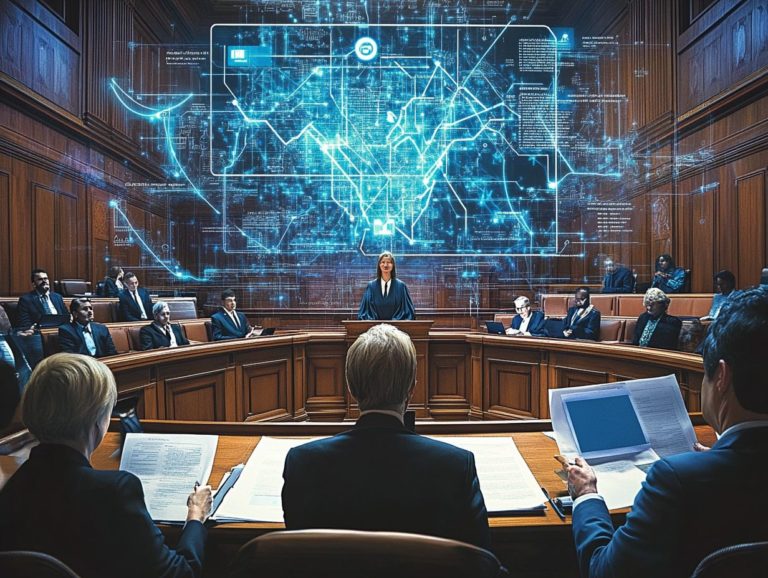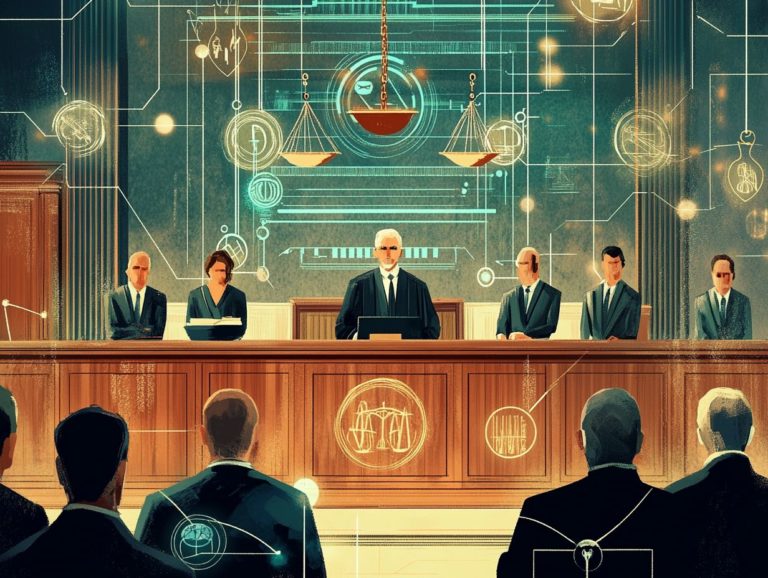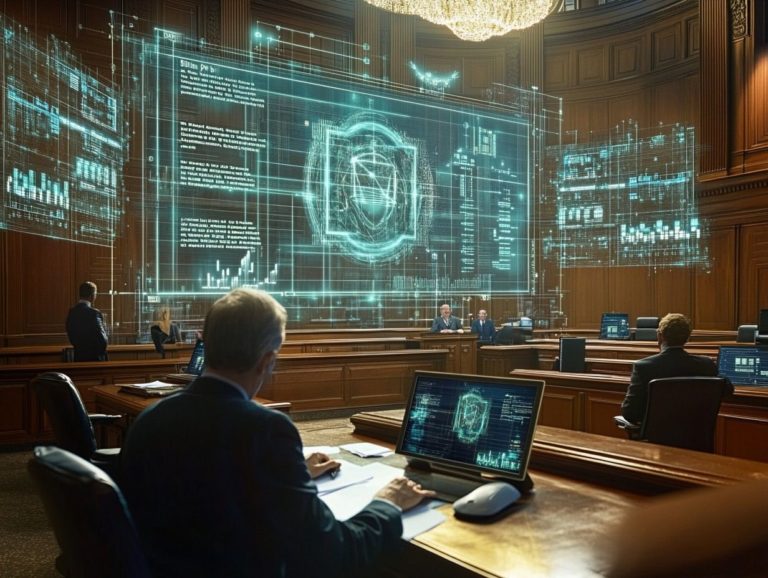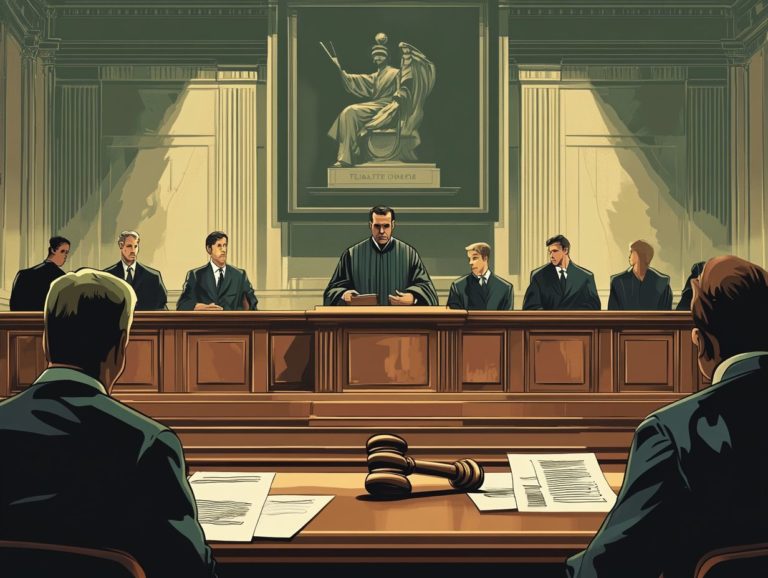The Rise of Online IP Litigation Cases
In an increasingly digital world, you may have noticed that intellectual property (IP) litigation is on the rise. This trend is evolving alongside the complexities of the online landscape. This overview highlights unique challenges such as jurisdictional issues and evidence collection, along with the significant impacts these cases have on both businesses and individuals.
The discussion covers best practices for navigating these cases and offers insights into future trends in IP law. Join us as we unpack this vital topic that is shaping the digital age.
Contents
- Key Takeaways:
- Overview of Online IP Litigation Cases
- Reasons for the Increase in Online IP Litigation Cases
- Challenges Faced by Online IP Litigation
- Impact of Online Intellectual Property Litigation on Businesses and Individuals
- Best Practices for Handling Online IP Litigation Cases
- Future Trends in Online IP Litigation
Key Takeaways:
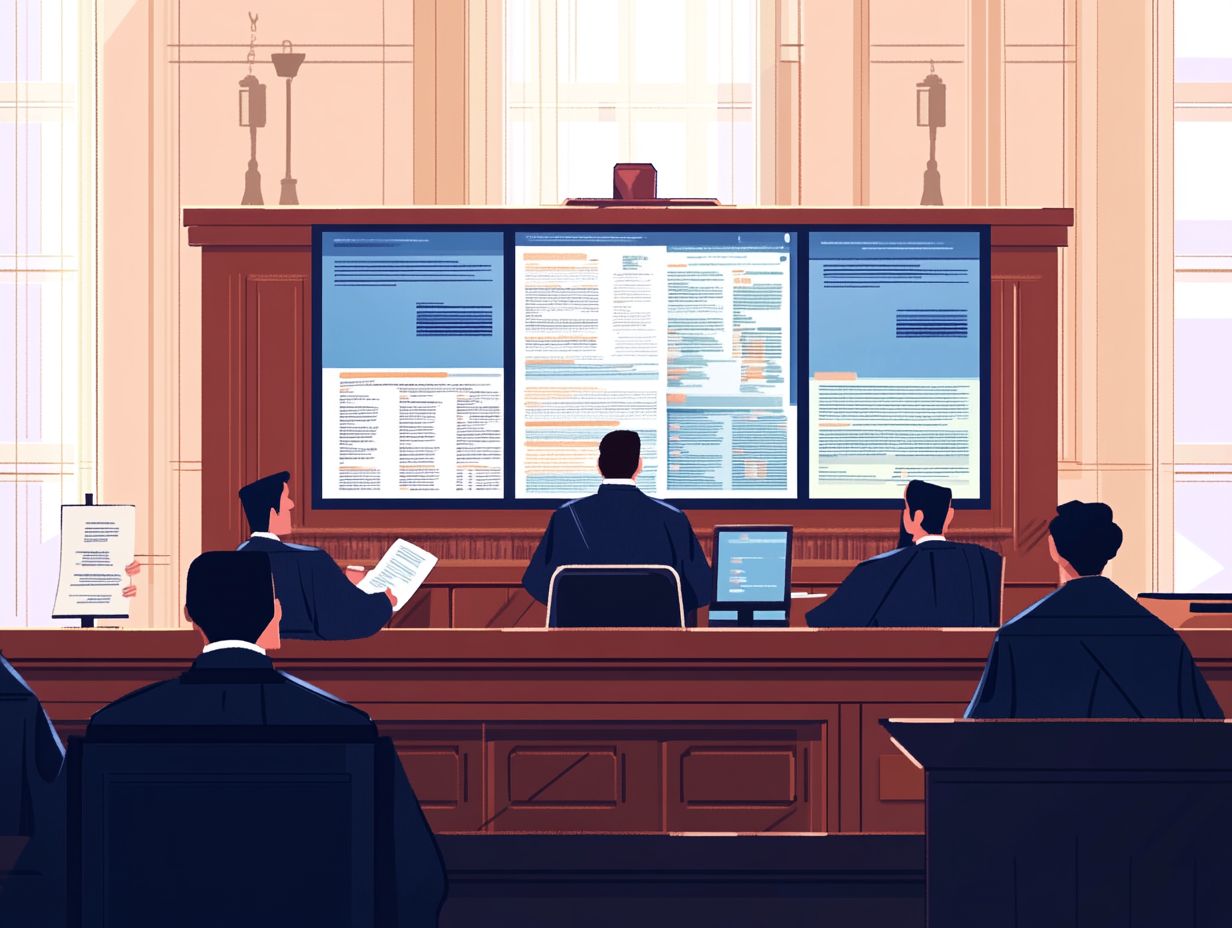
The rise of online IP litigation cases is driven by advancements in technology and globalization, presenting new challenges for businesses and individuals. Handling this type of litigation requires careful consideration of jurisdiction, evidence collection, and reputation protection strategies. Understanding the role of technology in modern IP litigation may help address these issues. Future trends in online IP litigation may bring changes in technology and laws, creating potential opportunities and challenges for litigants.
Overview of Online IP Litigation Cases
You may have noticed an increase in online IP litigation cases lately. This trend reflects the intricate dynamics of the IP market, highlighting major IP litigation trends.
This surge is fueled by technological advancements, shifting economic landscapes, and the rising influence of companies that do not produce or sell products but hold patents.
Evolving legal trends also significantly shape the strategies of operating companies as they work to protect their intellectual property. Navigating these challenges is essential, particularly as litigation risks continue to emerge within the technology sector.
Definition and Types of IP Litigation
IP litigation encompasses a wide array of legal disputes concerning intellectual property. This includes patent claims, copyright infringement, trade secrets, and the complexities of licensing agreements.
In patent litigation, you ll often look into groundbreaking innovations. Copyright cases typically focus on the unauthorized reproduction or distribution of artistic works. The safeguarding of trade secrets is critical, as businesses depend on proprietary information to maintain their competitive edge.
Licensing agreements add another layer of complexity. A thorough understanding of the terms involved is necessary to sidestep potential conflicts. Each category of IP litigation presents unique challenges and strategies, underscoring the importance of expert legal guidance.
Reasons for the Increase in Online IP Litigation Cases
The rise in online IP litigation cases can be traced to various factors. Rapid advancements in technology foster innovation at an unprecedented pace, while globalization creates an environment ripe for cross-border disputes, highlighting the role of the internet in IP litigation.
Economic downturns intensify competitive pressures among firms, often leading to aggressive enforcement strategies against IP infringement. Understanding these dynamics is crucial for navigating the complexities of intellectual property in today’s digital landscape.
Advancements in Technology
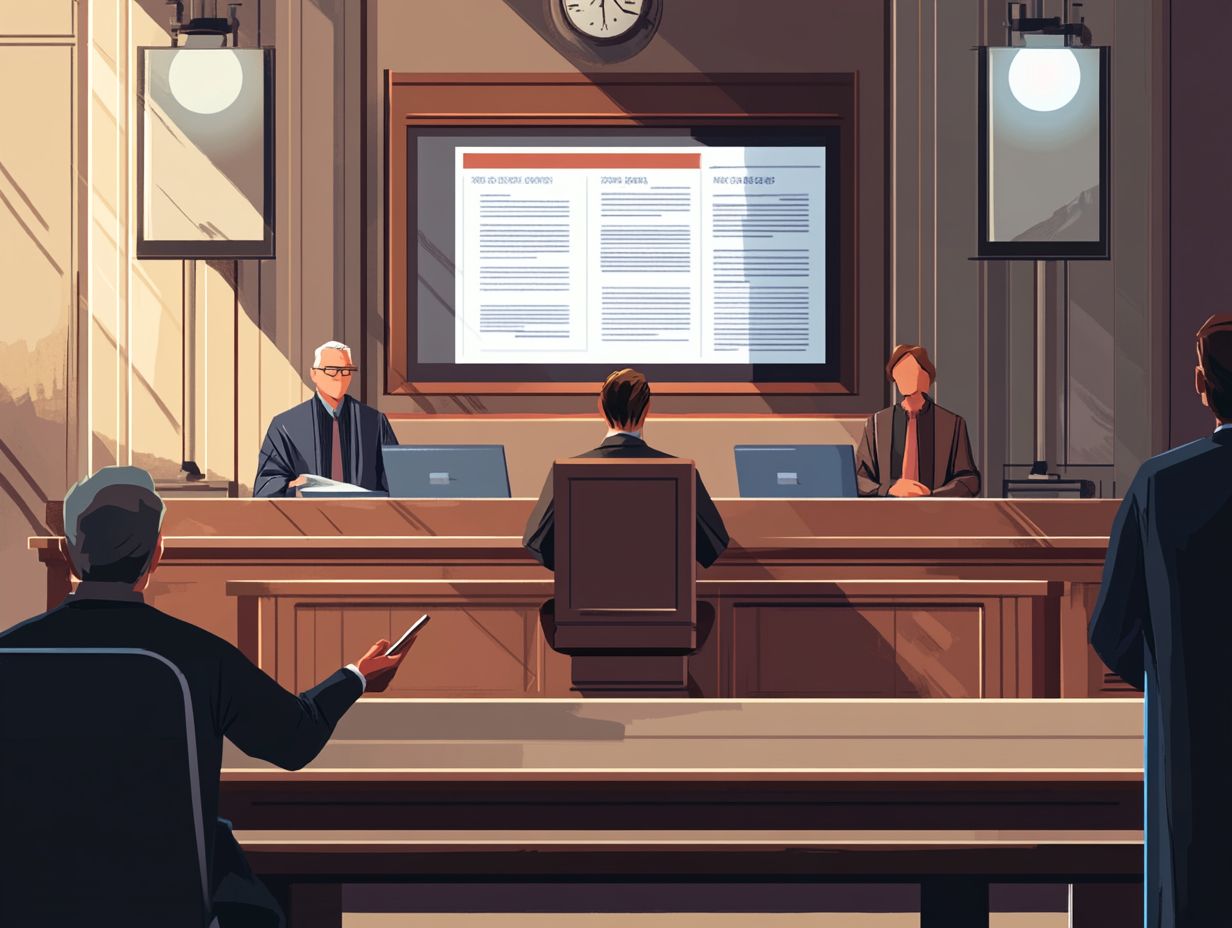
Advancements in technology, particularly within AI and software innovations, have transformed the landscape of patent litigation. This presents new challenges in protecting intellectual property.
As industries rapidly embrace these innovations, you may find yourself navigating complex legal battles that reveal vulnerabilities in existing patent frameworks. Consider high-profile cases involving giants like Google and IBM; they raise essential questions about the ownership and originality of algorithms crafted for machine learning applications.
The ramifications of these disputes extend beyond individual companies, prompting you and policymakers alike to reassess IP protection strategies. With emerging technologies continuously evolving, the urgency for robust frameworks that effectively address patent disputes and ensure fair competition becomes critical.
This evolving landscape is reshaping how you navigate the intricacies of intellectual property rights. Stay informed and prepared as these trends develop!
Globalization and Cross-Border Disputes
Globalization has led to more cross-border disputes in IP litigation. You need to navigate international IP laws while dealing with economic risks and competition.
This landscape reveals the complex nature of intellectual property rights. You must adapt your strategies to meet new challenges.
For example, major tech giants often find themselves tangled in legal battles that span continents, such as the ongoing patent infringement dispute between a U.S. company and a competitor in Asia.
These cases underscore the complexities arising from differing national regulations and highlight the challenges presented by varying judicial practices and enforcement mechanisms.
It s essential to understand global IP frameworks. This knowledge helps safeguard your innovations and maintain your competitive edge.
Challenges Faced by Online IP Litigation
Engaging in online IP litigation comes with a distinct set of challenges, especially regarding jurisdiction and venue issues.
These complexities can significantly hinder the enforcement of your statutory rights and make collecting authentic evidence a daunting task.
Jurisdiction and Venue Issues
Jurisdiction and venue issues are important in online IP litigation, as they dictate where you can file a case and where it will ultimately be heard. Jurisdiction refers to the authority of a court to hear a case. Venue is the location where the case is tried.
These factors significantly influence the strategies you employ in patent litigation. The legal parameters not only determine how a case progresses but also shape the potential outcomes for all parties involved.
For example, you might find a strategic edge by selecting a jurisdiction with laws that are more favorable to your position, while the opposing party could exploit venue considerations to argue for a more advantageous courtroom setting.
Recent cases serve as a reminder of the intricacies involved; one tech giant faced significant setbacks due to improper jurisdiction claims, highlighting the necessity of meticulous legal guidance before making any procedural choices.
As a practitioner or client, it s crucial to remain vigilant in ensuring compliance with jurisdictional requirements. Any misstep could lead to dismissed cases or unfavorable rulings, so staying informed and prepared is essential.
Evidence Collection and Authentication
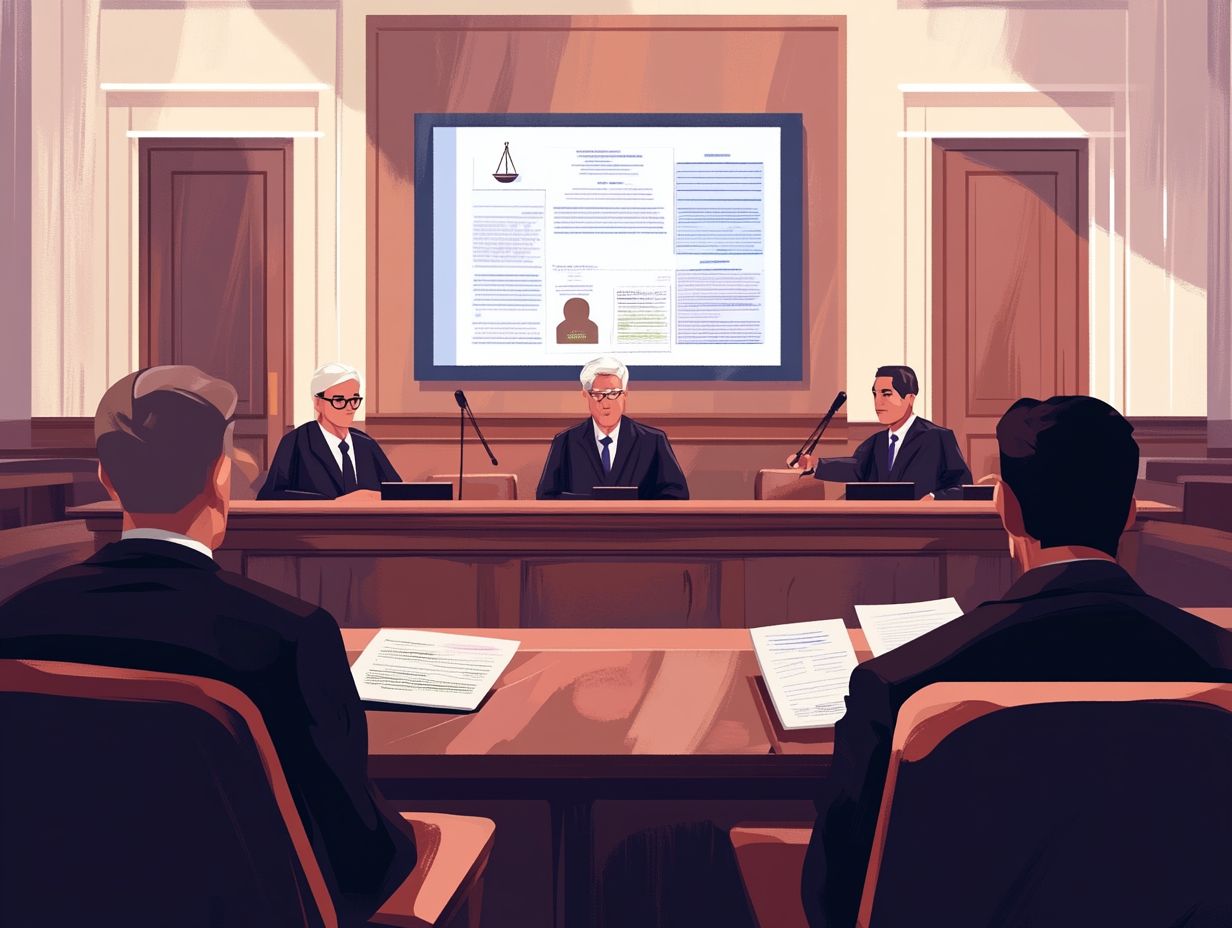
Your success hinges on effective evidence collection and authentication. Navigating trade secrets and enforcement strategies requires careful attention to detail.
Collecting relevant evidence comes with its fair share of challenges, particularly in ensuring data integrity and tackling the risk of potential tampering. Take, for instance, high-stakes cases that hinge on proprietary algorithms; the authenticity of digital records can truly be the difference between winning and losing a claim.
Courts are increasingly turning to forensic experts to verify the origins and modifications of evidence, underscoring the importance of robust authentication techniques. A prime example can be found in landmark litigation related to a stolen software program, where demonstrating the chain of custody through meticulous documentation and digital signatures proved essential in holding the infringer accountable.
Impact of Online Intellectual Property Litigation on Businesses and Individuals
Online IP litigation can dramatically impact your business or personal ventures. Be prepared to face potential costs and reputation risks!
This reality highlights the necessity of implementing effective brand protection strategies.
Costs and Time Considerations
Online IP litigation can be expensive. Consider options like litigation finance and nonrecourse funding to manage these costs.
The financial implications can quickly escalate into six figures, influenced by case complexity, jurisdiction, and the duration of proceedings. Timelines often stretch from several months to years, prompting many to explore alternative funding strategies.
Litigation finance can provide crucial support, allowing you to pursue claims without upfront costs. Nonrecourse funding offers a unique approach, linking repayment to the success of the litigation, which eases immediate financial burdens.
Reputation and Brand Protection
Reputation and brand protection are vital if your business is involved in online IP litigation. Public feedback can impact your licensing agreements and business strategy.
In our digitally connected world, negative reviews can spread rapidly, harming stakeholder trust and investor confidence. Act quickly to manage your reputation!
Use social listening tools, create engaging content to build goodwill, and address inaccuracies swiftly. Educating stakeholders about the importance of intellectual property rights is key to protecting your brand’s image and ensuring customer loyalty.
By implementing these strategies, you foster a positive public perception and bolster your company’s resilience against potential crises, leading to lasting success.
Best Practices for Handling Online IP Litigation Cases
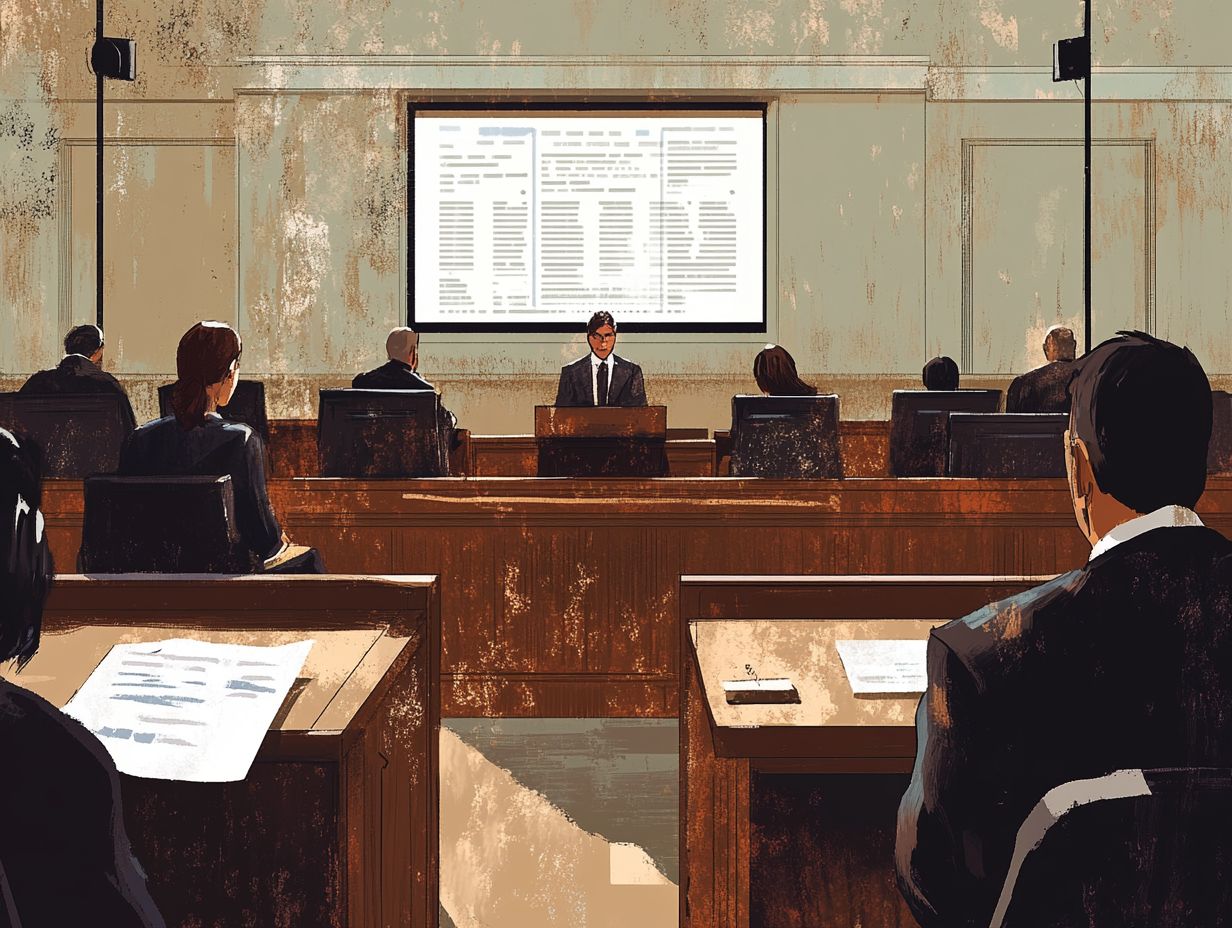
To manage online IP litigation cases, develop a comprehensive strategy that blends effective risk management with sound legal advice.
A multifaceted approach enables you to launch targeted enforcement campaigns and secure the best possible outcomes.
Strategies for Success
Success in IP litigation needs strategic foresight. Keep current litigation trends and enforcement strategies in mind.
Leveraging data analytics can be invaluable as you navigate complex intellectual property disputes. This approach helps you identify patterns and predict outcomes, enhancing your strategies’ efficiency.
Staying attuned to emerging trends, such as digital piracy and the implications of artificial intelligence, is crucial for drafting comprehensive enforcement strategies. Incorporating these insights into your litigation playbook better equips you to face challenges, protecting your clients’ innovations in this evolving landscape.
Future Trends in Online IP Litigation
The future of online IP litigation promises remarkable transformations, influenced by emerging technologies and evolving laws.
Judicial changes have the potential to redefine enforcement dynamics and reshape legal interpretations, paving the way for a new era in intellectual property disputes.
Potential Changes in Technology and Laws
Technology and laws are changing rapidly. These shifts will reshape IP litigation, especially regarding patents and copyrights.
Advancements like artificial intelligence and blockchain are redefining how we create and share the creations of the mind, such as inventions and artistic works. Businesses need to navigate a more complex legal landscape.
Stay alert and adapt your strategies. Working together, attorneys and policymakers can tackle these challenges effectively.
These changes may foster collaboration, with technology enhancing enforcement mechanisms that benefit everyone.
Frequently Asked Questions
- What are online IP litigation cases? These cases involve legal disputes over intellectual property rights that arise from online activities.
- What has caused the rise of online IP litigation cases? The increase in online content creation and distribution has led to more opportunities for infringement.
- What types of intellectual property rights are involved? Common rights include trademarks, copyrights, patents, and trade secrets, protecting various aspects of products and content.
- What are the consequences of losing an online IP litigation case? Consequences can include financial damages, injunctions against using infringing content, and damage to reputation.
- How can businesses protect themselves? Businesses should register their IP rights, monitor for infringement, and take swift legal action when necessary.
- What unique challenges do online IP cases present? Challenges include jurisdiction issues and the need for specialized knowledge of technology and IP law.
Act now to protect your rights by consulting with an IP attorney and reviewing your intellectual property status.

